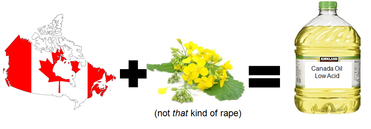|
The term canola oil is an etymological outlier in so many senses: it is an acronym, it is a euphemism, it is redundant, and we got the word because of rape. This might confuse you, and rightly so, but here I discuss rape the plant, a mustard which yields rapeseeds. These rapeseeds were popular for use in creation of cooking oils- cooking oils with dangerous high-acid health effects that were eventually banned by the CDC. Then, in the 1970s, two researchers at the University of Manitoba created a safer version and decided to market it. However, there was so much negative stigma around rapeseed oil because of the past hazards and the fact that the word rape was in there that they decided to call it canola oil, the first element combining the words Canada Oil, Low Acid. This, of course, repeats the word oil twice when you say canola oil, making it all the more interesting. To this day, Canada is the world's largest rapeseed producer, but it's all hidden under the pleasantly Italian-sounding guise of canola. Help expose the conspiracy!
Thanks to Thomas Ottaway for the inspiration to write this particularly interesting blog post.
2 Comments
Gareth Cooley
12/17/2020 07:37:53 pm
Your article was great. Simple, direct, educational, and entertaining.
Reply
Emma
2/6/2023 05:36:57 pm
While your piece is well written and keeps people's attention. As someone with ptsd and with a loved one with severe cptsd however, I happily welcome the alternative term.
Reply
Your comment will be posted after it is approved.
Leave a Reply. |
AUTHORHello! I'm Adam Aleksic. I have a linguistics degree from Harvard University, where I co-founded the Harvard Undergraduate Linguistics Society and wrote my thesis on Serbo-Croatian language policy. In addition to etymology, I also really enjoy traveling, trivia, philosophy, board games, conlanging, and art history.
Archives
December 2023
TAGS |



